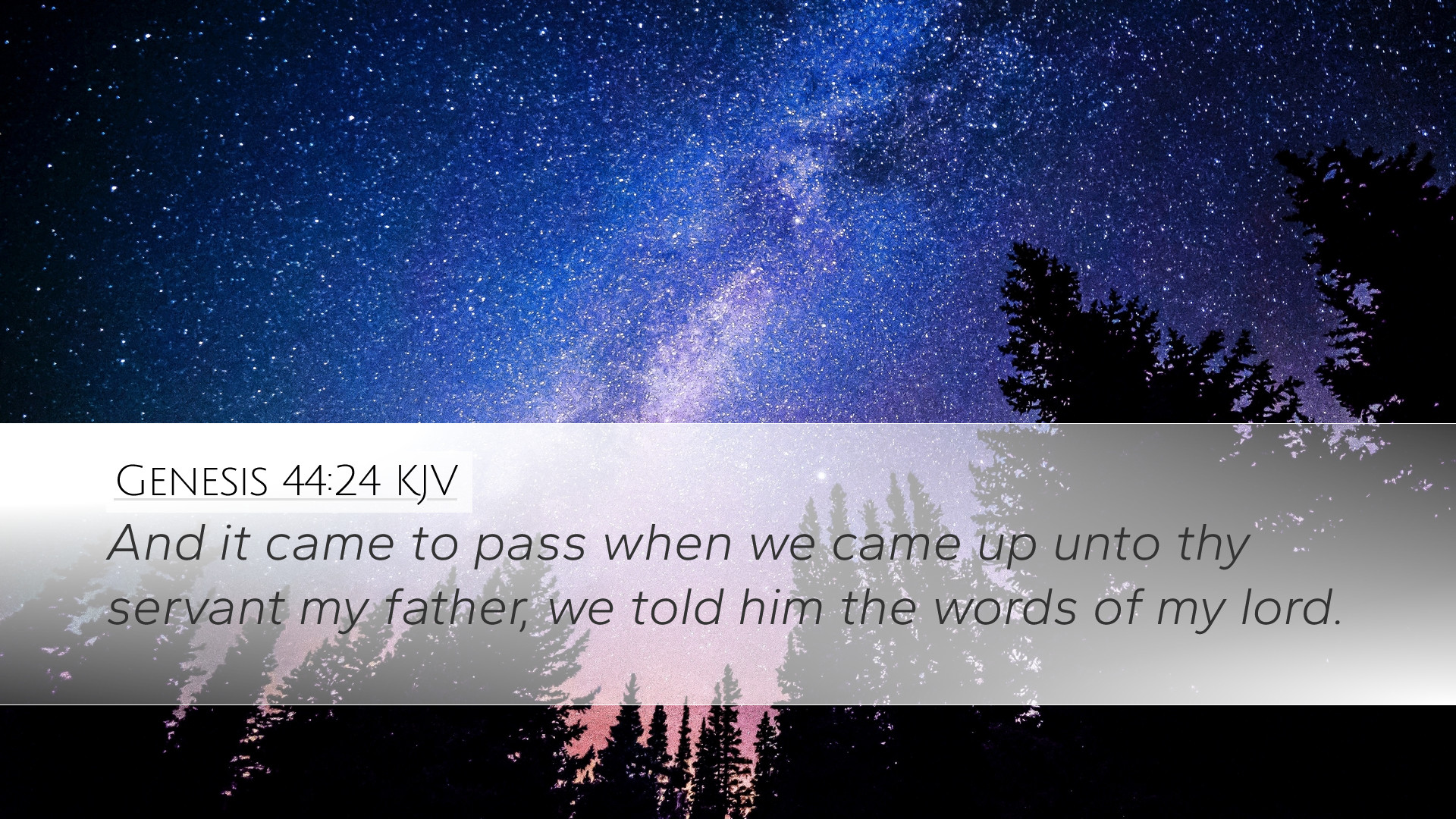Commentary on Genesis 44:24
Genesis 44:24 states: "And when we came to your servant my father, we told him the words of my lord; and our father said, 'Go again, and buy us a little food.'" This verse encapsulates a moment of profound significance in the narrative of Joseph and his brothers, emphasizing themes of responsibility, familial bonds, and the unfolding of God's providential plan.
Contextual Background
The scene unfolds in Egypt during a time of famine. Joseph, who has risen to power, is testing his brothers to see if they have changed since selling him into slavery. The mention of their father highlights the emotional weight of their situation. The brothers' actions are not merely about acquiring food; they are laden with deeper implications regarding their character and relationships.
Insights from Commentary
Matthew Henry's Commentary
Matthew Henry observes that this verse is pivotal, as it illustrates the return of the brothers to their father Jacob with vital news about their journey. Henry points out the significant emotional turmoil experienced by the family. He notes that their father’s command to "go again" not only reveals his desperation but also reflects a lack of understanding of the circumstances surrounding the brothers’ previous trip.
Henry further emphasizes the familial bond that binds them, stating that their father is still in the dark about Joseph's true identity. This ignorance creates tension that drives the narrative forward, demonstrating that familial relationships are often complicated by secrets and misunderstandings.
Albert Barnes' Notes
Albert Barnes offers a detailed exposition on the relational dynamics observed in this passage. He discusses the brothers' predicament and the emotional burden they carry back to Jacob. Barnes emphasizes how their father's words demonstrate both a child's longing for sustenance and a parent's desire for his family’s wellbeing. The command to return for food also reflects the dire circumstances of famine, which propels the action of the narrative.
Barnes highlights the implications of Jacob's instructions, suggesting that they denote a sense of urgency and the hope of survival. This represents a critical moment where the family's need for food symbolizes a broader dependence on God's provision amidst crises, aligning with themes of divine sovereignty in the biblical narrative.
Adam Clarke's Commentary
Adam Clarke expounds on the emotional weight carried by the brothers during their return to their father. Clarke contemplates the psychological effects of their past actions—selling Joseph into slavery—and how these weigh upon their conscience as they engage with Jacob. He notes that the brothers are acutely aware of their father’s fragility and emotional state, thus underscoring a profound sense of guilt that permeates their relationship.
Furthermore, Clarke examines the concept of divine providence, asserting that God orchestrates events to lead Jacob and Joseph back together. He views the journey back to Egypt not merely as a practical necessity but as part of a divine plan that involves reconciliation and redemption. This aligns with the overarching narrative of Genesis, where God’s sovereignty intersects with human actions.
Theological Reflections
This poignant moment within the broader narrative of Genesis prompts deeper theological reflections. The encounter between Joseph and his brothers serves as an archetype for understanding forgiveness and familial redemption. Each brother’s return to Jacob not only signifies a physical journey but also represents an emotional and spiritual quest for reconciliation.
Family and Responsibility
The brothers' interactions with Jacob reveal the immense responsibility they feel for their family’s welfare. This notion of responsibility is central to Christian theology, where believers are called to care for one another. Just as the brothers must confront their past, modern readers are invited to reflect on the significance of repentance and restoration within their own family units.
God’s Sovereignty
The providential hand of God remains a constant theme in the Joseph narrative. Despite the brothers’ betrayal, God's plans unfold in a manner that seeks redemption rather than punishment. This illustrates a profound theological truth about God’s ability to work through human failings to achieve His purposes, a principle that resonates deeply within pastoral and scholarly reflections on divine grace.
Conclusion
Genesis 44:24 encapsulates a moment pregnant with emotional and spiritual turmoil. By examining the text through the lenses of commentary from Henry, Barnes, and Clarke, we gain a multifaceted understanding of the depth of the narrative. The interplay of familial obligation, the quest for sustenance, and the overarching theme of God’s providence encourages readers to contemplate their own lives in light of these biblical truths.
In the shared experience of hunger and reconciliation, both ancient and modern believers can find hope, knowing that God remains actively involved in the lives of His people, guiding them through trials towards restoration.


